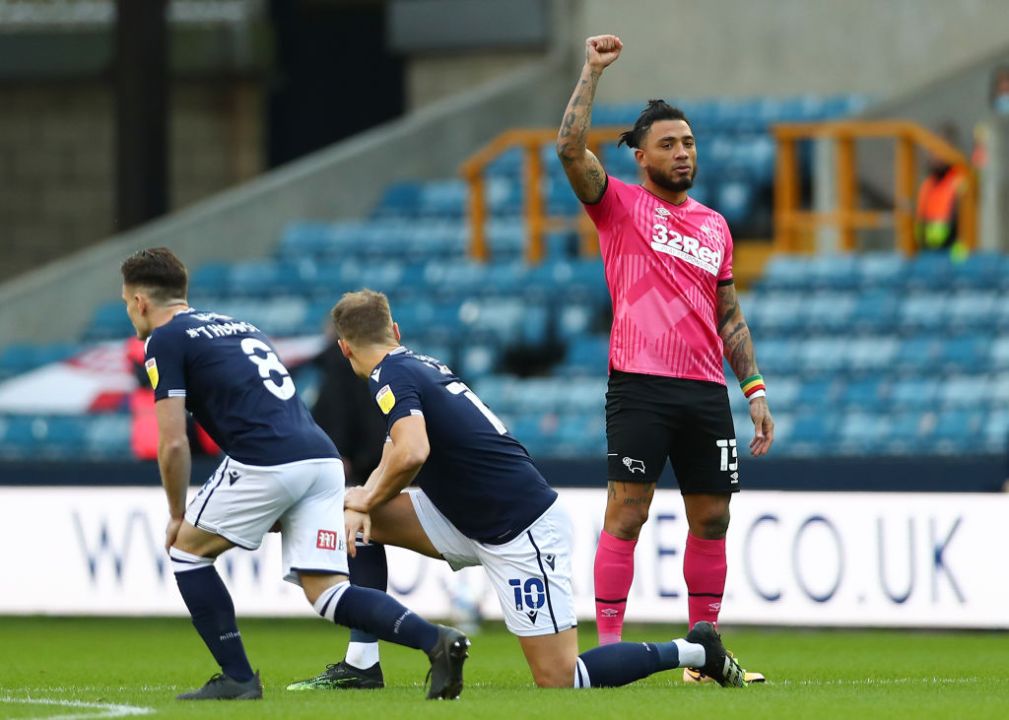Were Millwall fans wrong to boo players who knelt in support of Black Lives Matter? Yes, according to the assembled pundits who are paid a fortune to talk about football.
‘Let’s be fair,’ wrote Gary Lineker, ‘it only appears to be a small minority of Millwall fans that didn’t boo the players taking the knee’. ‘Reality is Millwall fans booing players taking a knee doesn’t surprise many!!!,’ said Trevor Sinclair, the ex-footballer who pleaded guilty in 2018 to a racially aggravated public order offence after he abused a police officer. Dion Dublin, whose career as Homes Under the Hammer presenter has been a lot more productive than his brief spell at Man United, was perhaps the most outspoken:
‘They don’t agree with taking the knee, which means they are racist. They don’t agree with Black Lives Matter; that says they are racist to me.’
It would be naïve, of course, to suggest that those Millwall supporters who booed players for ‘taking the knee’ at the Den on Saturday did so having scrutinised the fine print of the BLM manifesto; it’s unlikely that they concluded that the proposal to defund the police was a step too far. Nor would it make for a convincing argument to conclude that what really riles Millwall fans is the fact that BLM opposes the concept of the Western nuclear family.
However, to condemn all Millwall supporters as being racists is unfair. The club has taken great strides in recent years to combat racist elements among its supporters and to cement community cohesion in its diverse part of London. In 1994, the club established ‘Millwall for all’, which, according to its website, was the first of its type at any English club. Other initiatives include ‘Hear hate? Don’t hesitate’, and continued support for Kick It Out, the grassroots organisation working so hard to combat racism in the game.
Football has changed astoundingly since the dark days of the 1970s and 1980s, when English fans were synonymous with hooliganism. Sadly black players were often the subject of vile abuse. Partly as a result of the Hillsborough tragedy, the game smartened up its act, becoming safer, more family-friendly – and much more tolerant. I guess it’s hard to be a committed racist when that lad who keeps banging in thirty-yarders happens to be black.
Unfortunately, as well as these welcome changes to football, not everything has been a step in the right direction. While racism has been effectively stamped out, the Premier League in particular has also become more sanitised and more expensive.
Millwall, currently in the Championship (Second Division in the old money) are far from glamorous; their ground, now renamed the Den to distinguish from the club’s former ground down the road, is in one of London’s less salubrious areas. Many of its supporters (of all ethnic backgrounds) are from working-class communities less likely to espouse glib liberal epithets.
But this doesn’t mean they are necessarily racist; in Britain, in general, the more working class you are, the more likely you are to have friends, neighbours and partners from diverse backgrounds. You are also more likely to be affected by sub-standard housing, poor public transport and competition for jobs. This doesn’t excuse the undoubted racism of a small minority of fans (at all clubs, not just Millwall). But it might explain why some fans are losing patience with the BLM brand, whose most vocal supporters also hold dear to the concept of white privilege – even where it is wholly absent from the lives of those white people growing up in poor areas of south London.
As someone who has written on and campaigned against racism for decades, I confess to finding the constant messaging about BLM irritating and counter-productive. Whose interests are served by Keir Starmer and the police taking the knee in support of an organisation whose followers have vandalised the Cenotaph, and which apparently seeks to ‘dismantle capitalism’?
It also seems that football is unfairly singled out here. In most other sports, to kneel in a gesture of solidarity is viewed as a matter of choice; why should football be any different?
Kneeling will always be, for many, a subservient gesture; surely a catchier slogan would be ‘Stand up to racism’? So why is it that sport – which, as a meritocracy, reflects the diversity of humanity so much more than, for example, acting, politics or business – is constantly expected to make statements about racism at all? Would all the armchair warriors condemning the ‘racism’ of Millwall – and in some cases calling for supporters to be banned altogether – be happy to take the knee at the start of each working day?
If anything, the diversity among football players speaks for itself; most football fans don’t care what colour a footballer’s skin is; they care only if that player can score goals. Other industries should take note of this forward-thinking approach. There is nothing wrong with educating people about injustice, prejudice and inequality, but is the place to do that really the football pitch?







Comments